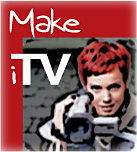What do they offer? A lot, like:
* Publishing and storing video, audio, manuscripts, and other media that you create
* Sharing your own and discovering others' independent media.
* Learning how to create citizens' media - that is, yours
* Sharing: RSS feeds, email to a friend, direct link to files from your own site or blog
* FREE storage, sharing & bandwidth forever
* NO ADS!
Downside (as it is):
* Requires an Internet Archive account too
* Slow to upload and view during most of the day
* Keeps your content in its native format. Both good and bad. It doesn't recompress your video - good, but requires viewers to have several different media players installed (not so good)
The Learning Center
My favorite is the Learning Center, which has everything you'd ever want to know about user-created citizens' media. With all the hoopla about copyrights, illegal downloading, Viacom vs. YouTube (see previous post), you DO want to know about your options. One of the best is the Creative Commons license, at work all over the site itself, making it very easy to grasp the concept as well as its execution. Nearly all contributions are shared that way, so other sites can republish bits and pieces from this open-source learning project.
So what can we learn about copyright and the law?
How about:
* Fair use in the digital age
* Online libel and defamation
* What is Creative Commons?
* Filmmakers' best practices in fair use
* Documentary filmmakers, fair use and 'free use'
* Legal issues in creating your podcast
* Release waivers - there is a link to forms
* Terms of Service comparison for video hosting sites
* Publishing public performances
Listen to Lauren Gelman, associate director of Stanford Law School's Center for Internet and Society, as she discusses copyright, fair use, and grassroots media. (You need a media player that works with industry standard MPEG-4 video, to watch.)

No comments:
Post a Comment